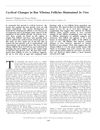Human placental extract exerts hair growth-promoting effects through the GSK-3β signaling pathway in human dermal papilla cells
August 2015
in “International Journal of Molecular Medicine”

TLDR Human placental extract may help hair growth by affecting certain cell signals and could be more effective with minoxidil.
The document presents a study that explored the hair growth-promoting effects of human placental extract (HPE) on human dermal papilla cells (hDPCs) and its potential use in treating hair loss. The study found that HPE promotes hair growth by inducing β-catenin expression through the inhibition of glycogen synthase kinase-3β (GSK-3β). HPE increased the viability and alkaline phosphatase (ALP) expression of hDPCs in a concentration-dependent manner. When combined with minoxidil (MXD), HPE was more effective in inhibiting GSK-3β and promoting hair elongation in rat vibrissa follicles. Additionally, HPE decreased the expression of TGF-β2, which is known to prevent apoptosis in the hair bulb region. The study suggests that HPE, especially when used with MXD, could be a novel therapeutic strategy for clinical hair loss treatment by activating the β-catenin/GSK-3β signaling pathway. The results are based on at least 3 independent experiments, but the exact number of hDPCs used is not specified, and further research is needed to confirm these findings.
View this study on spandidos-publications.com →
Cited in this study

research A role of placental growth factor in hair growth
Placental growth factor may help treat hair loss.

research Valproic acid promotes human hair growth in in vitro culture model
Valproic acid may help hair grow and could be a safe treatment for hair loss.

research Hair loss and herbs for treatment
Herbs can potentially treat hair loss by inhibiting a key enzyme and promoting hair growth, and deficiencies in zinc, biotin, and iron are linked to hair loss.

research Combination of herbal extracts and platelet-rich plasma induced dermal papilla cell proliferation: involvement of ERK and Akt pathways
Herbal extracts and platelet-rich plasma together may help increase hair growth by making certain cells grow more, through specific cell growth pathways.

research Minoxidil Use in Dermatology, Side Effects and Recent Patents
Minoxidil treats hair loss, promotes growth, has side effects, and has recent patents.

research Valproic Acid Induces Hair Regeneration in Murine Model and Activates Alkaline Phosphatase Activity in Human Dermal Papilla Cells
Valproic Acid helps regrow hair in mice and activates a hair growth marker in human cells.

research Persistent Sexual Side Effects of Finasteride for Male Pattern Hair Loss
Finasteride for hair loss can cause long-lasting sexual side effects like low libido and erectile dysfunction.

research Minoxidil activates β-catenin pathway in human dermal papilla cells: A possible explanation for its anagen prolongation effect
Minoxidil helps hair growth by activating the β-catenin pathway.

research Hair growth stimulatory effect by a combination of 5-aminolevulinic acid and iron ion
A mix of 5-aminolevulinic acid and iron ion can speed up hair growth.

research Cyclical Changes in Rat Vibrissa Follicles Maintained In Vitro
Rat vibrissa follicles are useful for studying hair growth cycles, especially the transition from pro-anagen to anagen.

research The Biology of Hair Follicles
Hair follicle biology advancements may lead to better hair growth disorder treatments.
research The secret life of the hair follicle
Hair follicles create different cell layers and proteins, controlled by various molecules.
Related

research Possible Cellular Communication with Human Follicle Dermal Papilla Cells via Secretions from Human Hair Follicle Keratinocytes
Substances from human hair cells can affect hair loss-related genes, potentially leading to new treatments for baldness.

research A model system to analyse the ability of human keratinocytes to form hair follicles
Scientists developed a system to study human hair growth using skin cells, which could help understand hair development and improve skin substitutes for medical use.

research Review of hair follicle dermal cells
Dermal cells are key in controlling hair growth and could potentially be used in hair loss treatments, but more research is needed to improve hair regeneration methods.
research STUDY ON HAIR FOLLICLE FORMATION INDUED BY DERAMAL PAPILLA CELL
Dermal papilla cells can help form hair follicles and produce hair.

research Trans‐species hair growth induction by human hair follicle dermal papillae
Human hair follicle cells can grow hair when put into mouse skin if they stay in contact with mouse cells.

research Role of hair papilla cells on induction and regeneration processes of hair follicles
Hair papilla cells can create and regenerate hair bulbs under the right conditions.